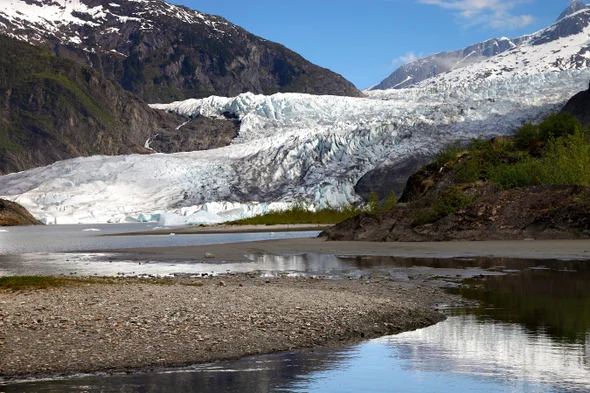
Glaciers May Melt Even Faster Than Expected
The study, published in Nature, found that thousands of years ago, glaciers in Europe retreated by up to 2,000 feet a day — more than a quarter-mile — for short periods. That's the fastest rate ever recorded and far faster than previous studies had suggested was possible.
Highlights
-
“One of the main punch lines of our paper is that under a fixed rate of melting, you would get markedly different rates of retreat over different bed shapes,”
-
By analyzing the amount of space between the ridges, the scientists measured how quickly the ice melted and retreated over time.
-
The study also found that the fastest pulses of retreat were short-lived, lasting just days or a few months at most.
AI generated version
Glaciers are massive rivers of ice that flow slowly downhill, shaped by the landscape beneath them. They are a crucial component of the Earth's climate system, helping to regulate global temperatures and sea levels. However, as the planet warms, glaciers are melting at unprecedented rates, contributing to rising sea levels and other climate-related impacts.
A recent study published in the journal Nature has shed new light on how glaciers behave when they retreat. The study, which focused on glaciers in Europe during the last ice age, found that glaciers retreated at rates of up to 2,000 feet per day for short periods. This is the fastest rate of retreat ever recorded and far faster than previous studies had suggested was possible.The researchers used a new method to analyze the amount of space between the ridges left behind by retreating glaciers. By measuring the spacing of the ridges, the scientists were able to determine how quickly the ice melted and retreated over time. The study found that under a fixed rate of melting, glaciers with different bed shapes retreated at markedly different rates.The study also found that the fastest pulses of retreat were short-lived, lasting just days or a few months at most. This suggests that glaciers can retreat quickly in response to changing conditions but then stabilize or even advance again as the conditions change again.The findings have important implications for understanding how glaciers will behave in the future as the planet continues to warm. While the study focused on glaciers during the last ice age, the results are relevant to modern-day glaciers, which are also retreating at unprecedented rates. The study suggests that glaciers can retreat rapidly in response to changing conditions, but then stabilize or even advance again if conditions change again.The study's lead author, Dr. Lee Stevens of the University of Edinburgh, said in a statement, "Our findings suggest that we need to think about the mechanisms that cause glaciers to speed up and slow down in a more nuanced way. We can't just assume that glaciers will retreat at a constant rate as the planet warms."In conclusion, the recent study published in Nature has found that glaciers in Europe retreated at unprecedented speeds thousands of years ago. The study's findings have important implications for understanding how glaciers behave in response to changing conditions and suggest that glaciers can retreat rapidly but then stabilize or even advance again if conditions change. As the planet continues to warm, it is crucial to continue studying glaciers to better understand their behavior and the potential impacts of their retreat.